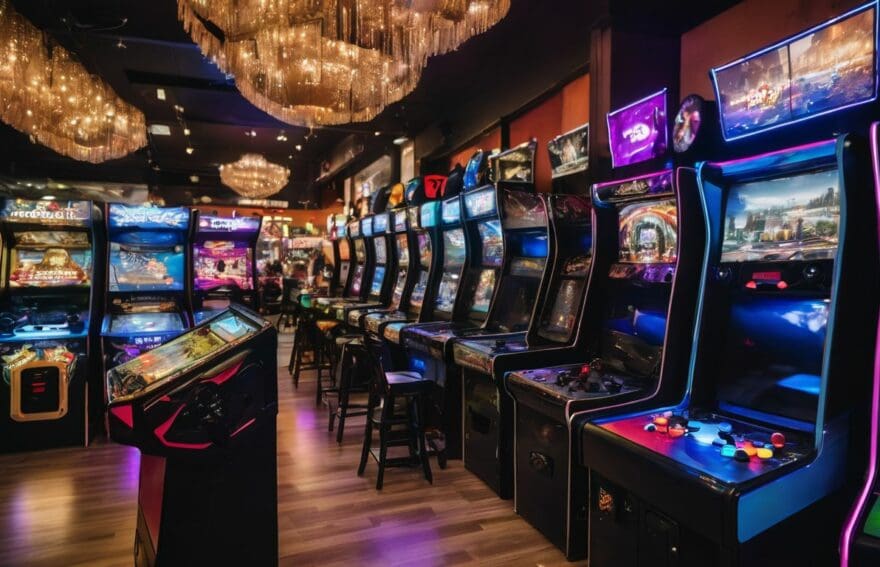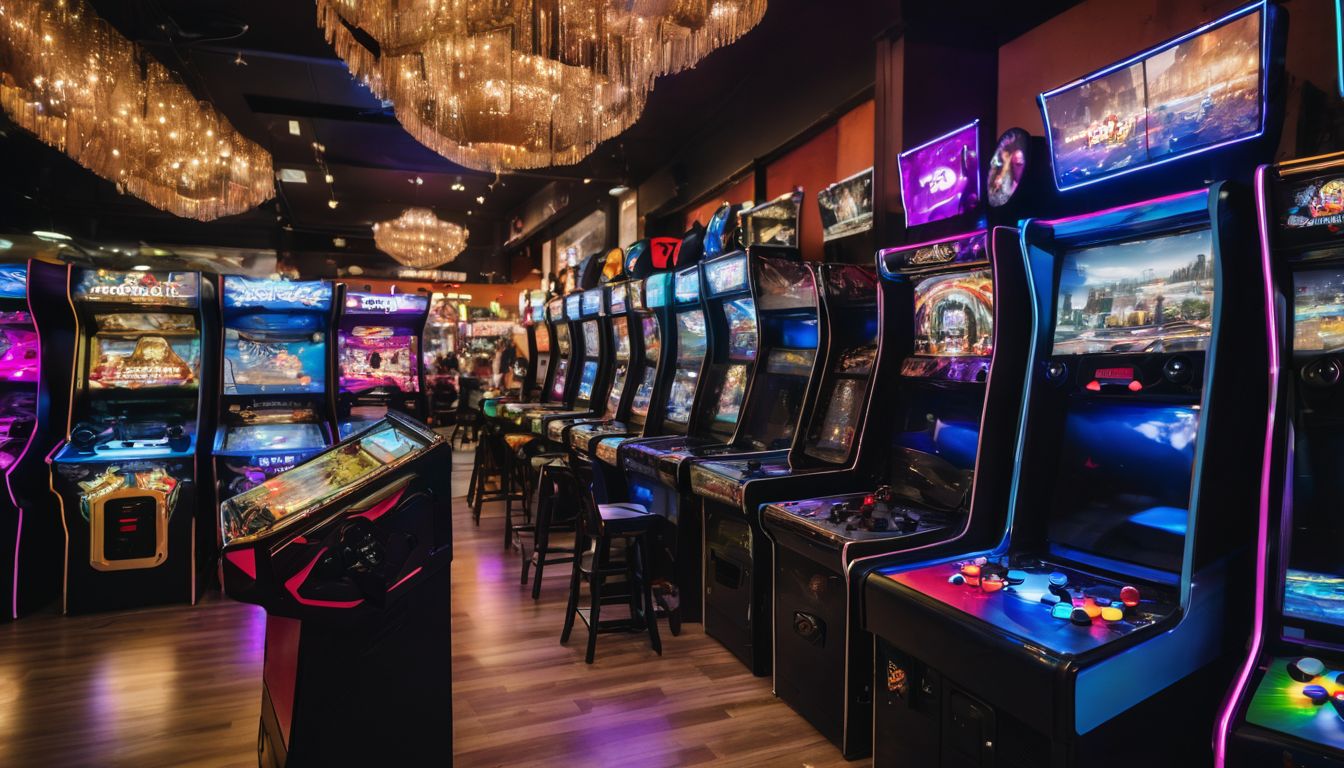Exploring Diversity in the Fighting Game Community

Updated On: November 29, 2025 by James Connolly

However, our insightful foray into the Fighting Game Community (FGC) brings with it rays of optimism and tangible strides towards inclusivity. This spirited collective is trailblazing a path towards diversity where every participant truly matters.
Carry on reading to immerse yourself in an arena where everyone has a role to play.
What is the Fighting Game Community (FGC)?
The Fighting Game Community (FGC) is a passionate and diverse community of gamers who are dedicated to competitive video games, particularly fighting games. It has evolved from grassroots origins into a thriving and inclusive space for players of all backgrounds and skill levels.
With a wide variety of fighting game genres, the FGC offers something for everyone, making it an inviting environment for gamers around the world.
Origins and evolution
We’ve seen the origins of fighting games date back to the early arcades, where colourful characters and simple controls invited players to duke it out. Classics like ‘Street Fighter’ and ‘Mortal Kombat’ defined a genre that has since blossomed into a crucial part of competitive gaming.
Over the years, these titles have evolved with more intricate gameplay mechanics and stunning visuals, captivating a diverse audience.
Our community started with local tournaments in video game shops and has grown into international events watched by millions online. As we progressed, so did our commitment to diversity; representation for people of color in games strengthened our racial diversity while fighting stereotypes head-on.
The FGC’s embracing attitude towards LGBTQ+ gamers stands as testament – we’re not just about kicking butt on screen but also championing inclusivity off it.
Types of fighting games
Fighting games come in various types, each with its distinct features and gameplay. Here are the different types of fighting games:
- Traditional 2D Fighting Games: These games are characterised by side-scrolling and typically feature a roster of diverse characters with unique fighting styles and special moves.
- 3D Fighting Games: In contrast to 2D fighting games, these titles allow for movement in a three-dimensional space, offering a different perspective and gameplay dynamics.
- Versus Fighting Games: This category includes games where players face off in one-on-one battles, often incorporating fast-paced action and strategic combat mechanics.
- Beat ’em up Brawlers: Often featuring cooperative multiplayer modes, beat ’em up brawlers involve players progressing through levels while engaging in combat with multiple opponents.
- Weapon-Based Fighting Games: These games centre around characters utilising various weapons during combat, adding an extra layer of strategy and diversity to the gameplay.
Inclusivity
In the Fighting Game Community (FGC), inclusivity is a core value, with emphasis placed on creating a welcoming environment for gamers of all backgrounds. Representation and diversity are actively promoted, leading to a community that celebrates people from various racial, cultural, gender, and sexual orientation backgrounds.
The FGC has made commendable progress in fostering an inclusive space where individuals can engage in competitive gaming without fear of discrimination or exclusion. With ongoing efforts to promote diversity and representation within the industry, the FGC continues to set an example for inclusivity in esports.
Moving on to “Diversity within the FGC”, let’s delve into its multifaceted nature and explore how it shapes the community dynamics.
Diversity within the FGC
The Fighting Game Community (FGC) is a diverse and inclusive space that encompasses people of various racial, gender, sexual orientation, and cultural backgrounds. This diversity is reflected in the players, content creators, and fans who make up the FGC.
Racial diversity
Racial diversity within the Fighting Game Community (FGC) is a significant aspect of its inclusivity. People of color are well-represented in both the player base and the characters featured in fighting games, contributing to a diverse and welcoming environment.
This representation has helped reshape the FGC into one of the most racially diverse communities in esports, fostering an inclusive space for gamers from various ethnic backgrounds to come together and share their passion for gaming.
The presence of people of color in fighting games has not only enriched the diversity within the FGC but also broadened the gaming industry’s representation as a whole. The genre’s ability to showcase characters from diverse racial backgrounds has played a pivotal role in making gaming more relatable and accessible to a wider audience.
Gender diversity
Gender diversity within the fighting game community (FGC) is an essential aspect of creating a more inclusive and welcoming environment for all gamers. The representation of diverse genders in gaming characters has contributed to breaking gender stereotypes, providing a more inclusive gaming experience for everyone involved.
This progress extends beyond character creation, with various initiatives aimed at promoting gender inclusivity and representation in esports tournaments and gaming communities. The FGC’s commitment to embracing diverse gender identities has been fundamental in fostering a sense of belonging and acceptance among gamers from different backgrounds.
Inclusivity in the FGC is not limited to just racial diversity but encompasses the representation of diverse genders as well. As we continue to champion equality within the gaming industry, it is crucial to celebrate the strides made towards gender diversity while also acknowledging that there is still work to be done to ensure equal opportunities and recognition for all individuals regardless of their gender identity.
LGBTQ+ representation
The fighting game community (FGC) has become a welcoming space for LGBTQ+ gamers, embracing diversity and inclusivity within the gaming world. The genre of fighting games has made notable strides in representing LGBTQ+ characters, contributing to a more diverse and representative gaming environment.
Inclusion and representation of LGBTQ+ individuals have been pivotal in making the FGC one of the most diverse communities in esports. This progress not only fosters a more inclusive environment but also sets an example for other gaming genres to follow suit, promoting greater acceptance and understanding within the broader gaming industry.
LGBTQ inclusion in gaming communities has led to increased visibility and positive representation of diverse identities. The FGC’s commitment to embracing all members highlights the power of representation, creating an environment where everyone feels welcome and celebrated.
Cultural diversity
Embracing cultural diversity is integral to the Fighting Game Community (FGC), fostering an inclusive environment where gamers from all backgrounds feel respected and valued. The FGC celebrates a rich tapestry of cultures, with characters and themes that resonate with players from diverse ethnicities.
This representation adds depth to gaming experiences, allowing for greater inclusivity in the portrayal of different cultural traditions within the fighting game genre. As a result, the FGC has become a melting pot of various cultural influences, enriching gameplay and fostering a sense of unity among its members.
The incorporation of cultural diversity in fighting games not only enhances storytelling and aesthetics but also broadens understanding and appreciation for different heritages within the community.
Challenges and Issues in the FGC
Stereotypes and racism are prevalent issues in the FGC, leading to discrimination and harassment within the community. Furthermore, there is a lack of representation in gaming companies, which perpetuates inequality in the industry.
Stereotypes and racism
Stereotypes and racism persist in the gaming community, impacting the experience of diverse players. We see a significant underrepresentation of minority groups in both game development and character design, perpetuating stereotypes and limiting inclusivity.
The lack of diverse representation can lead to harmful racial and gender biases that affect how players are perceived within the community. These outdated stereotypes hinder the potential for a more inclusive environment which is essential for all gamers to feel welcome.
Racism and prejudices continue to be challenges within the FGC, hindering its progress towards becoming fully inclusive. It’s crucial for us as a community to confront these issues head-on by actively promoting diversity and standing against discrimination whenever it occurs.
By recognising these disparities, we can work towards creating an environment that celebrates our differences rather than reinforcing harmful stereotypes or biases.
Lack of representation in gaming companies
Overcoming stereotypes and racism in the Fighting Game Community (FGC) has been a significant stride, but there is still a pressing issue of lack of representation in gaming companies.
This creates barriers for diverse voices to be heard and included in the development processes, resulting in limited diversity in game characters and narratives. The absence of representation also impacts the gaming industry’s ability to authentically connect with an increasingly diverse audience, ultimately hindering progress towards greater inclusivity and accessibility.
Gaming community initiatives are working towards addressing these issues by advocating for more inclusive hiring practices within gaming companies. As passionate gamers, we can support these efforts by fostering dialogue around the importance of diverse perspectives in game development, encouraging companies to embrace inclusivity as a core value.
Discrimination and harassment
Discrimination and harassment persist in the Fighting Game Community (FGC), creating barriers for many gamers. LGBTQ+ representation in gaming communities faces discrimination, affecting the inclusivity of the FGC.
Racial diversity within the FGC has made significant strides but is still subjected to stereotypes and prejudice. Gender diversity in fighting games also confronts challenges, with some female gamers experiencing mistreatment and exclusion.
The community acknowledges that these issues need to be addressed to ensure a more welcoming environment for all players.
The FGC’s battle against discrimination is ongoing as it strives to create a more inclusive space for all individuals irrespective of race, sexual orientation, or gender identity. It’s essential for passionate gamers and new enthusiasts alike to recognise the impact of discrimination and unite in support of a diverse and accepting gaming community.
Positive Progress in the FGC
– More diverse game characters and inclusion of underrepresented groups have been making strides in the FGC, creating a more inclusive gaming environment. In addition, there has been a growing effort towards promoting diversity and representation in tournaments, as well as increased support from allies within the community.
More diverse game characters
Game characters are becoming more diverse, representing a wide range of ethnicities and backgrounds. This trend is leading to increased inclusivity in the fighting game community (FGC), providing players with a broader spectrum of representation that reflects their own identities.
By featuring characters from various cultures and backgrounds, game developers are acknowledging the importance of diversity and striving to create a gaming environment where everyone feels seen and included.
Additionally, the inclusion of diverse game characters has resonated positively with gamers who appreciate seeing themselves reflected in the games they play. This step towards inclusivity not only enriches gaming experiences but also contributes to breaking down stereotypes and promoting understanding among players from different walks of life.
Inclusion and representation in tournaments
In tournaments, the fighting game community (FGC) actively works to promote inclusion and representation. Organisers prioritise diverse participants, ensuring that gamers from all backgrounds have an opportunity to compete.
This commitment has led to a more inclusive gaming environment, where players feel represented and valued. The FGC’s efforts in promoting diversity within tournaments contribute to a richer and more welcoming competitive scene for all involved.
The FGC also emphasises inclusivity through character representation in tournaments. Diverse characters from different cultural backgrounds are showcased, offering players the chance to see themselves reflected in the games they love.
Allies and support systems
Inclusion and representation in tournaments have led to the emergence of allies and support systems within the fighting game community (FGC). Gamers from all backgrounds are coming together to support diversity initiatives, advocating for more inclusive game design and diverse character representation.
These allies are actively working towards creating a more welcoming and supportive environment for all gamers, regardless of race, gender, or sexual orientation. Their efforts contribute significantly to breaking down stereotypes, promoting inclusivity, and ensuring that everyone feels valued and accepted within the FGC.
The presence of strong support systems within the gaming community also encourages individuals from underrepresented groups to participate in competitive gaming without fear of discrimination or harassment.
The Importance of Diversity in the FGC
Creating a welcoming and inclusive environment in the Fighting Game Community is essential for promoting diversity, encouraging more inclusivity in the gaming industry, and empowering individuals through representation.
If you want to learn more about how diversity can positively impact the FGC, keep reading!
Creating a welcoming and inclusive environment
To create a welcoming and inclusive environment within the Fighting Game Community (FGC), we need to continue championing diversity and representation. This means actively supporting initiatives that promote inclusivity, such as diverse character creation in fighting games and organising tournaments that welcome players from all backgrounds.
It’s crucial that we advocate for more equal opportunities and fair treatment for everyone, regardless of their race, gender, sexual orientation, or cultural background. By celebrating the rich tapestry of diversity within the FGC and beyond, we can foster an atmosphere where all gamers feel valued and respected.
In our efforts to create a more inclusive space within the FGC, it’s important to recognise the power of representation in video games. By showcasing characters from diverse backgrounds and identities, game developers can help players see themselves reflected in the virtual world.
Encouraging more diversity in the gaming industry
Encouraging more diversity in the gaming industry is crucial for fostering a community that reflects the rich tapestry of gamers worldwide. Game developers and industry leaders should actively seek out diverse talent to ensure varied perspectives are represented in game creation.
We need to see more characters from different ethnicities, genders, and sexual orientations to resonate with a wider audience and make gaming a more inclusive space. Embracing diversity not only cultivates new ideas but also sends a powerful message of acceptance and belonging that resonates with players across the globe.
To create an environment where every gamer feels seen and heard, we must continue championing initiatives that promote diversity within the gaming industry. By amplifying diverse voices, we can bridge gaps, challenge stereotypes, and inspire future generations of gamers to enjoy a world of games that truly mirrors their individual experiences.
The power of representation
Representation in the fighting game community holds immense power, shaping the experiences of gamers from all walks of life. The diverse characters and narratives within fighting games provide a platform for underrepresented groups to see themselves reflected and celebrated.
This visibility offers a sense of validation and belonging, fostering an inclusive environment that embraces individuals regardless of race, gender, sexual orientation, or ability.
As more gaming companies prioritise diverse representation, we witness a positive shift towards challenging stereotypes and promoting equality in gaming.
The impact of representation extends beyond the virtual realm; it influences societal attitudes towards diversity and inclusivity. By showcasing a wide range of identities within games, the fighting game community not only entertains but also educates and inspires understanding among its global audience.
Conclusion
In conclusion, the Fighting Game Community (FGC) celebrates diversity and inclusion, embracing people of various races, genders, sexual orientations, and cultural backgrounds. The FGC has made considerable progress in overcoming stereotypes and creating a more open and welcoming environment for all gamers.
This diverse representation not only enriches the gaming experience but also plays an essential role in fostering inclusivity within the broader gaming industry. Ultimately, exploring diversity in the FGC highlights its pivotal role in challenging traditional norms and promoting a more inclusive gaming community.
FAQs
1. What does exploring diversity in the fighting game community involve?
Exploring diversity involves looking at how different people are included and represented, considering aspects like gender, race, and LGBTQ+ inclusion within the gaming community.
2. Why is inclusivity important in the fighting game community?
Inclusivity ensures that everyone feels welcome to play and enjoy games regardless of their background, promoting equality and challenging stereotypes in gaming.
3. How can game streaming help with diversity?
Game streaming allows a wide range of players to share their aesthetics of play, showcasing cultural meanings and highlighting racial and ethnic diversity in esports.
4. Are there initiatives for enhancing LGBTQ+ inclusion in gaming communities?
Yes, there are various initiatives aimed at increasing LGBTQ+ representation and supporting inclusivity among those who participate in competitive gaming.
5. Can fighting games improve disability representation in video games?
Fighting games have opportunities to lead by example, integrating characters with disabilities into their rosters to reflect intersectionality within the broader gaming community.


